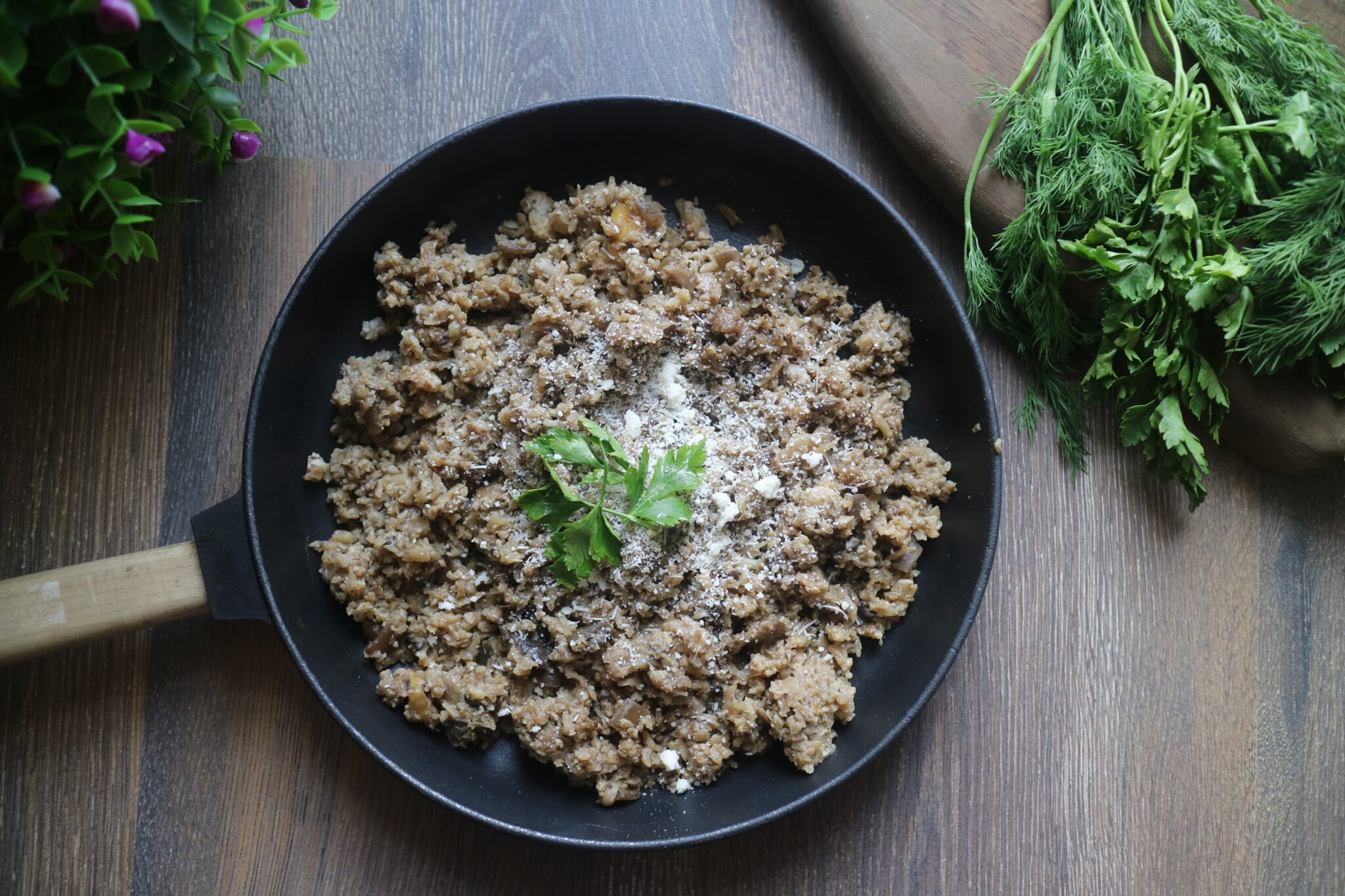Are you a fitness enthusiast with a passion for bodybuilding? Have you ever wondered if it’s possible to build muscle on a low-carb diet? Look no further because the article, “Keto and Bodybuilding: Building Muscle on a Low-Carb Diet,” provides comprehensive guidance and insights on how to achieve muscle growth while following a keto lifestyle. This article offers beginner-friendly advice, specialized dietary approaches for different groups, discussions on health and performance optimization, tips on integrating the keto diet into daily life, and even explores combining keto with other diets and practices. Whether you’re a beginner or someone looking to deepen their knowledge on the keto lifestyle, this article has got you covered!
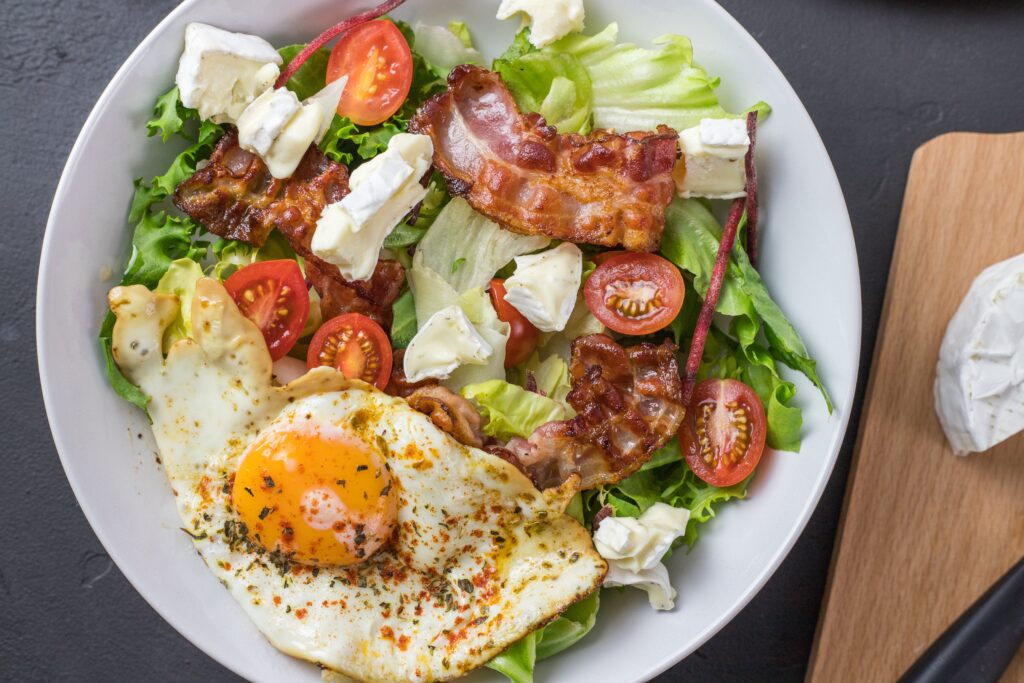
Introduction to Keto and Bodybuilding
Welcome to the world of keto and bodybuilding! In this article, we will explore how the ketogenic diet can benefit bodybuilders and help them achieve their fitness goals. The combination of keto and bodybuilding can lead to increased fat burning, stable blood sugar levels, and reduced inflammation for faster recovery. We will also discuss the important nutrients for bodybuilding on a keto diet, the right foods to choose, meal planning tips, and the use of supplements. Additionally, we will provide guidance on tracking progress, adjusting macros, dealing with the keto adaptation phase, and even a sample workout routine for keto bodybuilders. It’s time to unlock the full potential of your bodybuilding journey with the power of keto!
Benefits of the Keto Diet for Bodybuilders
Increased fat burning for better muscle definition
One of the key benefits of the keto diet for bodybuilders is its ability to promote increased fat burning. By drastically reducing carbohydrate intake and increasing your consumption of healthy fats, your body enters a state of ketosis, where it relies on fat as its primary source of fuel instead of glucose. This can help you shed excess body fat and achieve a more defined and sculpted physique, allowing your hard-earned muscles to shine.
Stable blood sugar levels for sustained energy
For bodybuilders, maintaining stable blood sugar levels is crucial for consistent energy levels throughout intense workouts. The keto diet, with its low-carbohydrate approach, helps stabilize blood sugar levels by preventing spikes and crashes. By relying on fats and ketones for energy, your body can avoid the rollercoaster effect caused by fluctuating blood glucose levels. This steady stream of energy can enhance your performance in the gym and improve overall endurance.
Reduced inflammation for faster recovery
Intense workouts can often lead to inflammation and muscle soreness. Fortunately, the keto diet has anti-inflammatory properties that can aid in faster recovery. By reducing your intake of inflammatory foods such as processed sugars and refined carbohydrates, you can minimize inflammation, allowing your muscles to repair and rebuild more efficiently. This can help you bounce back quickly from challenging workouts and optimize your muscle growth potential.
Important Nutrients for Bodybuilding on Keto
Getting sufficient protein
Protein plays a vital role in muscle growth and repair, making it essential for bodybuilders. While the keto diet is known for its high fat content, it’s equally important to ensure you consume enough protein. Good sources of protein on a keto diet include lean meats, poultry, fish, eggs, and dairy products. Aim for around 1 to 1.5 grams of protein per pound of body weight to support your muscle-building goals.
Ensuring proper fat intake
As a bodybuilder on a keto diet, fat will be your main source of energy. It’s crucial to prioritize healthy fats that provide essential nutrients and support optimal bodily functions. Avocados, nuts, seeds, olive oil, and coconut oil are excellent choices. Be mindful of your fat intake and focus on incorporating a variety of fats into your meals to ensure a well-rounded and nutrient-dense diet.
Monitoring electrolyte levels
When following a keto diet, your body excretes more water and electrolytes. It’s essential to monitor your electrolyte levels and replenish them accordingly. Sodium, potassium, and magnesium are particularly important. You can obtain these electrolytes through foods like leafy greens, salted nuts, and avocados. Additionally, consider using electrolyte supplements or electrolyte-enhanced water to help maintain proper electrolyte balance and avoid potential side effects like muscle cramps and fatigue.
Choosing the Right Foods for Keto Bodybuilding
High-quality protein sources
To support your muscle-building goals, it’s important to choose high-quality protein sources that are also low in carbohydrates. Lean meats like chicken, turkey, and lean cuts of beef are excellent choices. Fish such as salmon, tuna, and tilapia are also great options due to their high protein content and omega-3 fatty acids that support muscle recovery and overall health. Including eggs, dairy products, and vegetarian protein sources like tofu and tempeh can provide additional variety in your diet.
Healthy fats for energy
Healthy fats are a cornerstone of the ketogenic diet and an excellent source of energy for bodybuilders. Opt for monounsaturated fats like avocados, olives, and olive oil, as well as polyunsaturated fats found in fatty fish, nuts, and seeds. Coconut oil and MCT oil, rich in medium-chain triglycerides, can be especially beneficial for providing a quick source of energy and supporting ketone production.
Fiber-rich vegetables for micronutrients
While the focus of the keto diet is on fat and protein, it’s important not to neglect your micronutrient needs. Incorporating fiber-rich vegetables like broccoli, spinach, kale, and cauliflower into your diet can provide essential vitamins, minerals, and antioxidants. These vegetables are low in carbohydrates and high in fiber, making them ideal for keto bodybuilders. They can also help promote healthy digestion and support overall well-being.
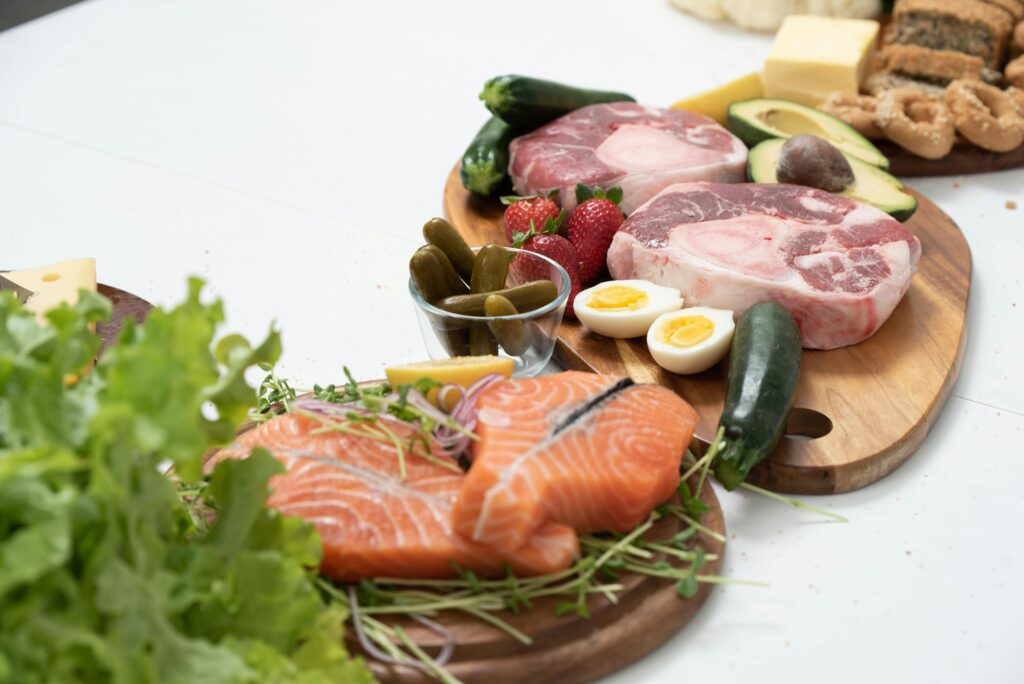
Meal Planning for Keto Bodybuilders
Calculating macronutrient ratios
Meal planning is crucial for success on a keto bodybuilding journey. To determine your macronutrient ratios, you’ll need to calculate your individual needs based on your goals, body composition, and activity level. Aim for a macronutrient distribution of approximately 60-75% of calories from fat, 15-30% from protein, and 5-10% from carbohydrates. Online calculators or consulting a registered dietitian can help you customize your nutrient ratios to maximize your bodybuilding results.
Pre- and post-workout meal ideas
Fueling your body properly before and after workouts is essential for optimal performance and muscle recovery. Prior to your workout, consider consuming a balanced meal containing protein and healthy fats. Examples include grilled chicken with avocado, a protein shake with almond butter, or a serving of Greek yogurt with mixed nuts. After your workout, focus on replenishing your glycogen stores and promoting muscle repair by consuming a combination of protein and carbohydrates. Ideas include a turkey wrap with lettuce, tomato, and whole grain tortilla, a protein smoothie with berries, or grilled salmon with sweet potatoes.
Planning for optimal nutrient timing
In addition to pre- and post-workout meals, nutrient timing throughout the day can play a role in maximizing your muscle-building potential. Consider spacing your meals evenly throughout the day to maintain a steady stream of energy and provide your muscles with a constant supply of nutrients. Keep in mind that individual preferences and schedules may vary, so finding a meal timing strategy that works best for you is important to support your bodybuilding goals on a keto diet.
Supplements for Keto Bodybuilders
Creatine for muscle strength and endurance
Creatine is a popular supplement among bodybuilders, and it can be beneficial for individuals following a keto diet. Creatine helps increase phosphocreatine levels in the muscles, leading to greater strength and endurance during workouts. It may also aid in muscle recovery and growth. Look for a high-quality creatine monohydrate supplement and follow the recommended dosage instructions for optimal results.
Branched-chain amino acids (BCAAs) for recovery
BCAAs are essential amino acids that play a crucial role in muscle protein synthesis. They can help reduce muscle protein breakdown and promote muscle recovery after intense workouts. Since the keto diet restricts certain protein sources, supplementing with BCAAs can ensure you maintain an adequate intake of these essential amino acids. Consider taking BCAAs before, during, or after your workouts to enhance recovery and support muscle growth.
MCT oil for increased ketone production
Medium-chain triglyceride (MCT) oil is a popular supplement among keto enthusiasts. MCTs are rapidly absorbed and can be converted into ketones, providing an additional source of fuel for your body and brain. Adding MCT oil to your meals or beverages, such as bulletproof coffee, can help increase ketone production and support a deeper state of ketosis. Start with a small dosage and gradually increase it to avoid digestive discomfort.
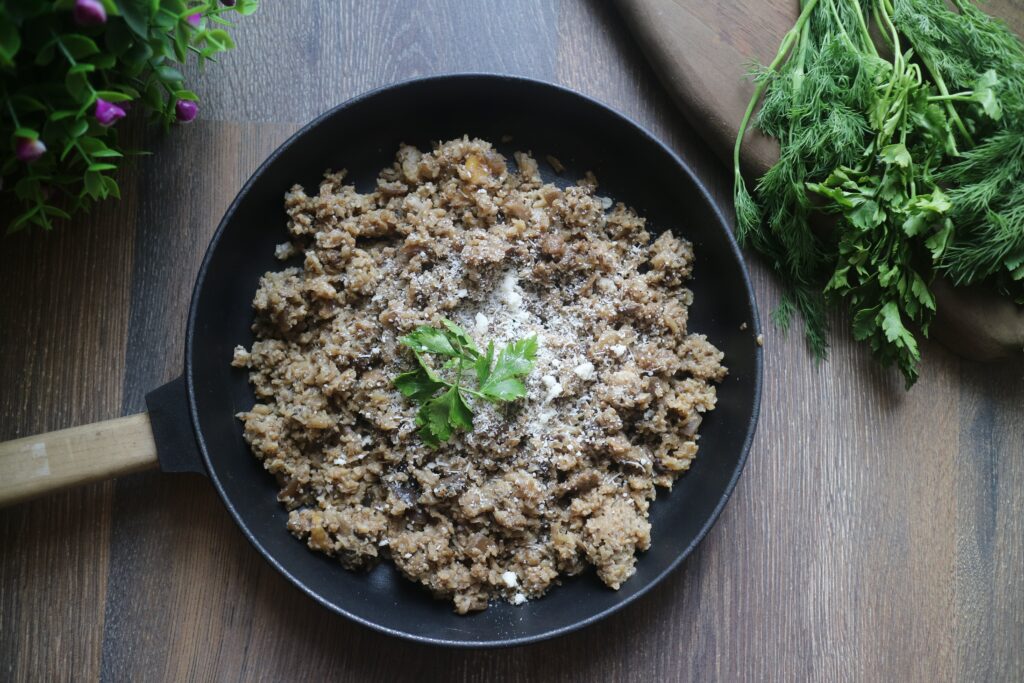
Tracking Progress and Adjusting Macros
Using body measurements and photos
Tracking your progress is essential for staying motivated and making adjustments along your bodybuilding journey. Beyond the number on the scale, consider taking body measurements and progress photos to assess changes in your physique over time. This can help you identify areas of improvement and celebrate your successes. Look for changes in muscle definition, reductions in body fat percentage, and overall improvements in your body composition.
Monitoring strength and performance
Bodybuilding is not just about aesthetics; it’s also about building strength and improving performance. Keep a workout log to track your strength gains, number of repetitions, and the intensity of your workouts. Notice how your body responds to different exercises and adjustments in your nutrition. By monitoring your strength and performance, you can make informed decisions about your training and nutrition to optimize your results.
Making adjustments based on results
As you progress on your keto bodybuilding journey, it’s essential to remain flexible and make adjustments as needed. Your macronutrient ratios, calorie intake, and supplementation may need to be modified based on your individual response to the keto diet. Pay attention to your body’s signals, such as changes in energy levels, mood, and overall well-being. Consulting with a registered dietitian or a healthcare professional can provide valuable guidance and ensure you’re making the necessary adjustments for continued progress.
Dealing with the Keto Adaptation Phase
Common challenges and how to overcome them
The keto adaptation phase, also known as the keto flu, can present some challenges for bodybuilders transitioning to a ketogenic diet. Common symptoms include fatigue, headaches, and brain fog as your body adjusts to using ketones as its primary fuel source. To overcome these challenges, ensure you’re consuming enough electrolytes, staying hydrated, and gradually reducing your carbohydrate intake rather than making sudden drastic changes. Your body will eventually adapt, and the challenges will subside as you become fully fat-adapted.
Gradually increasing carb intake for better muscle glycogen
While the keto diet is typically low in carbohydrates, some bodybuilders may find it beneficial to incorporate targeted or cyclical keto approaches to optimize muscle glycogen. Targeted keto involves consuming a small amount of carbohydrates before or after workouts to provide additional fuel for intense training sessions. Cyclical keto involves regularly cycling between periods of standard keto and higher carbohydrate intake to replenish muscle glycogen. Experiment with these approaches and find what works best for your body and performance goals.
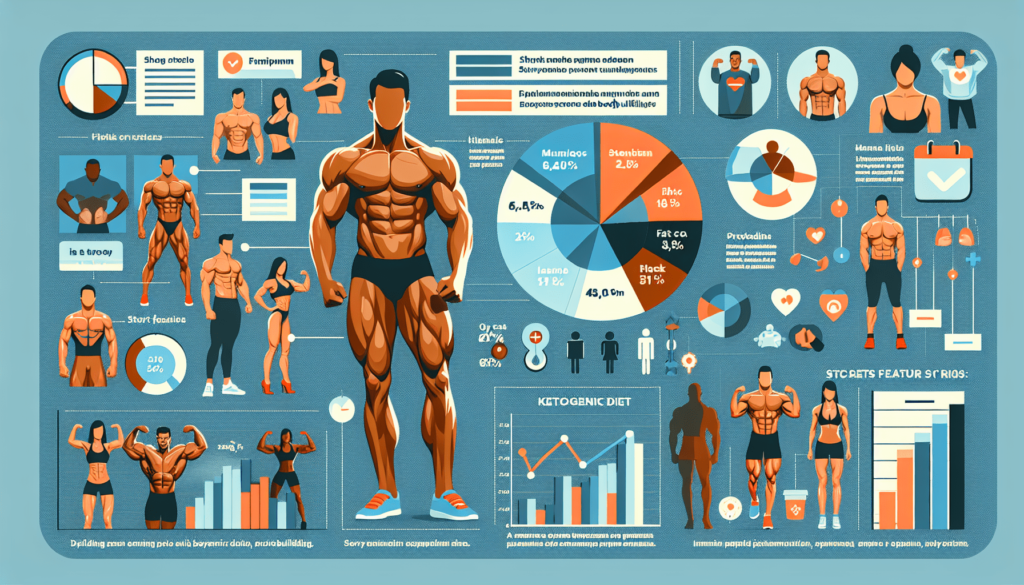
Sample Workout Routine for Keto Bodybuilders
Resistance training for muscle growth
Resistance training is essential for bodybuilders aiming to build muscle mass and strength. Focus on compound movements such as squats, deadlifts, bench presses, and shoulder presses, as they engage multiple muscle groups simultaneously. Aim for 3-4 weightlifting sessions per week, allowing for adequate rest and recovery between workouts. Incorporate both heavy lifts with low repetitions to build strength and lighter lifts with higher repetitions to promote muscle hypertrophy.
Cardiovascular exercise for endurance
While bodybuilding primarily focuses on strength and muscle development, cardiovascular exercise is still important for overall endurance and cardiovascular health. Incorporate 2-3 cardiovascular workouts per week, such as running, cycling, or swimming, to enhance your cardiovascular fitness. Keep in mind that excessive cardio can interfere with muscle growth, so finding the right balance between cardiovascular exercise and resistance training is key.
Recovery and rest days
Rest and recovery are just as important as your workouts when it comes to bodybuilding on a keto diet. Allow your body ample time to recover and rebuild between training sessions. Aim for at least one or two full rest days per week to prevent overtraining and optimize your muscle gains. During rest days, focus on activities that promote relaxation, such as yoga, stretching, or light walking. Remember, recovery is an essential component of achieving your bodybuilding goals.
Monitoring Health and Safety on a Keto Diet
Regular blood tests for nutrient levels
Monitoring your nutrient levels regularly is important when following any diet, including the keto diet. Since the keto diet restricts certain food groups, it’s crucial to ensure your body is receiving all the necessary vitamins and minerals. Schedule regular blood tests to check for any deficiencies and work with a healthcare professional or registered dietitian to address them effectively. They can guide you on appropriate supplementation if needed and help ensure your bodybuilding journey is safe and sustainable.
Importance of hydration and electrolyte balance
Hydration and electrolyte balance are essential elements of optimal performance and overall health, especially when following a keto diet. Drink plenty of water throughout the day to stay hydrated and aid in digestion and elimination. Additionally, pay attention to your electrolyte levels, as they can become imbalanced on a low-carb diet. Focus on consuming electrolyte-rich foods and consider adding electrolyte supplements or enhanced water to your routine to maintain proper electrolyte balance.
Consulting a healthcare professional for guidance
While this article provides comprehensive information on keto and bodybuilding, it’s always advisable to consult with a healthcare professional before starting any new diet or exercise regimen. They can evaluate your individual needs, medical history, and goals to provide personalized guidance and ensure that you’re on the right track. A healthcare professional can help monitor your progress, address any concerns or challenges, and ensure that you’re following a safe and effective diet and workout plan tailored to your bodybuilding aspirations.
In conclusion, integrating the principles of the ketogenic diet into your bodybuilding journey can yield numerous benefits. From increased fat burning and improved muscle definition to stable energy levels and speedy recovery, keto can provide the foundation for reaching your fitness goals. By focusing on getting sufficient protein, choosing the right foods, planning your meals, incorporating supplements, and monitoring your progress, you can optimize your bodybuilding results on a keto diet. Remember to prioritize your health and safety by regularly assessing nutrient levels, staying hydrated, and seeking professional guidance when needed. Embrace the power of keto and embark on a transformative bodybuilding journey that unlocks your full potential!

